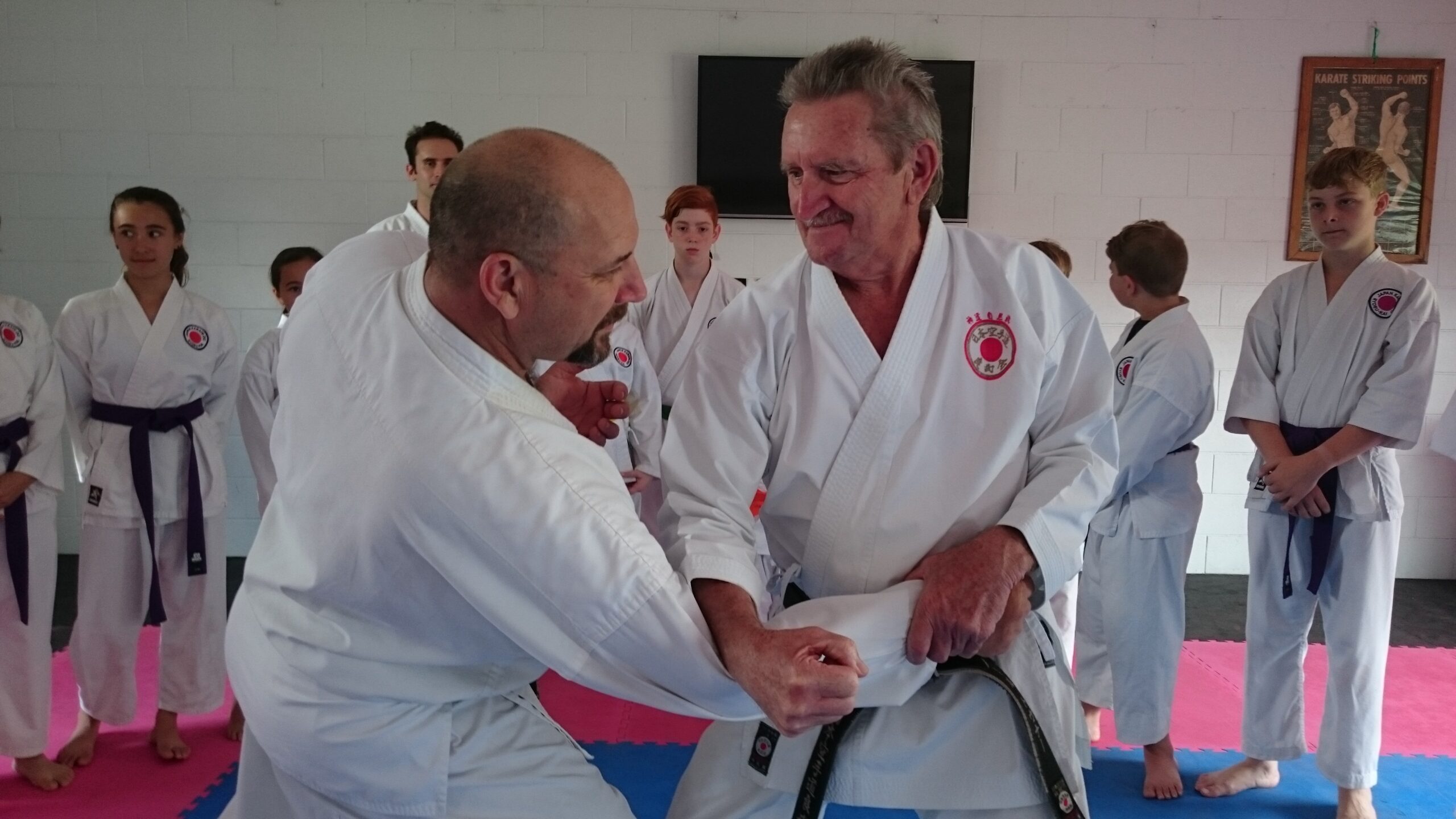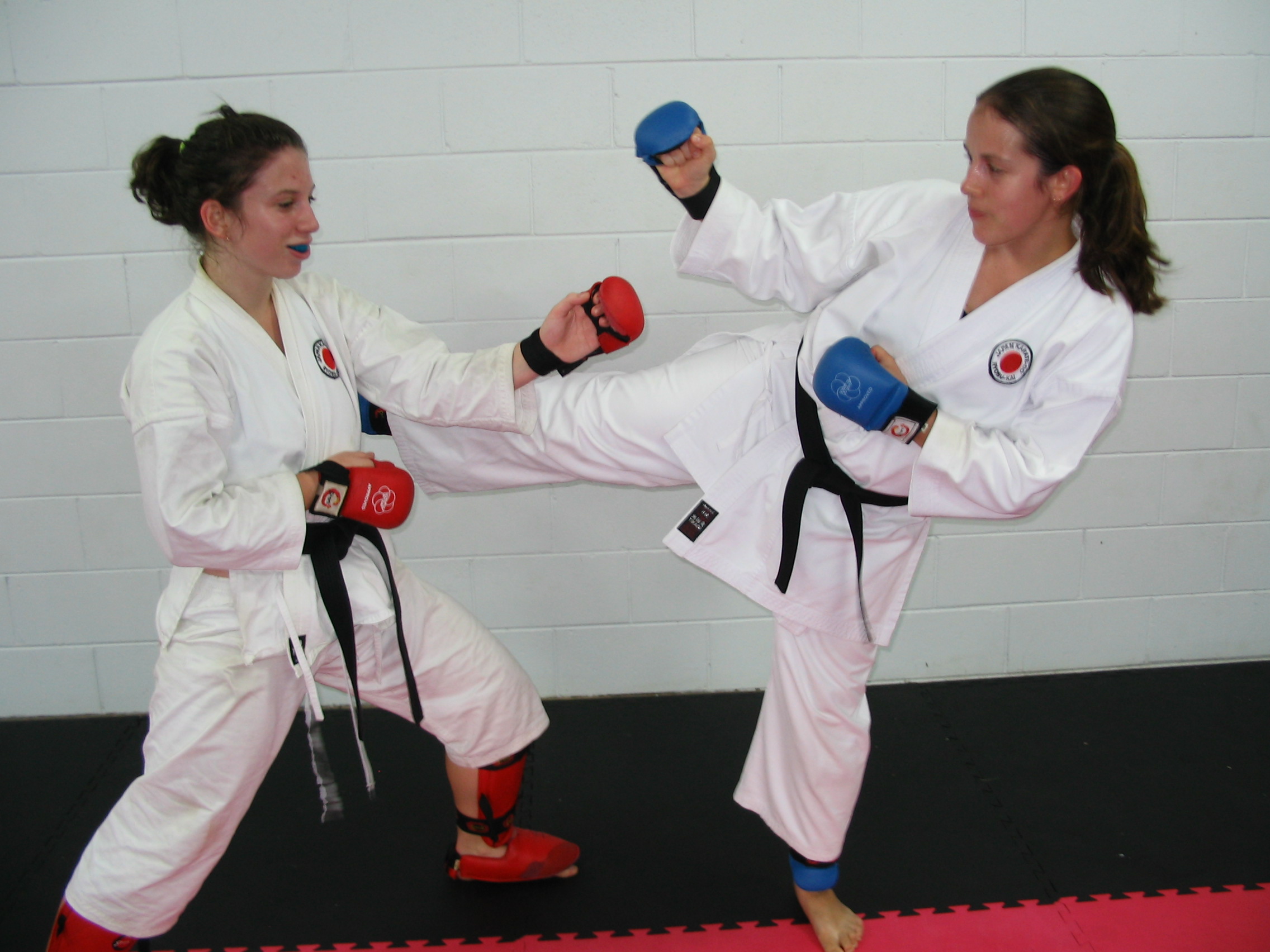The Gympie Karate Club Inc. offers a friendly and professional atmosphere for individuals, families and children. We provide expert coaching, facilities and equipment and pride ourselves on providing the best possible service at the best possible price.

What is Karate?

Sensei Yamazaki & Noel Turner in Gympie
The origins of Karate date back more than a thousand years.
First practised by religious monks in China, this Martial Art was introduced into Okinawa and blended with the indigenous fighting techniques of the islands.
This new Martial Art, due to its Chinese origin, was called Karate – written in Chinese characters with the literal meaning” Chinese Hand”.

Sensei Konishi & Noel Turner in Japan
The characters were later changed by the Japanese to mean “Empty Hand”, thus Karate became a weaponless form of self-defence. Yet Karate is much more than a way of fighting.
To the sincere student, it is a form of combined physical and mental disciplines from which one can learn humility and gentleness, gain self-confidence, and eventually attain a harmony of mind and body.
Philosophies of Early Karate Masters
The academy is not limited to one style but mainly practises
SHOTOKAN-RYU, developed by Gitchin Funakoshi, who is regarded as the “Father of Modern Day Karate”. The academy also trains SHINDO JINEN RYO. Yasuhiro Konishi, a student of Gitchin Funakoshi, Kenwa Mabuni and Choki Motobu, founded this style.
Gitchin Funakoshi believed in the saying “Karate Ni Sente Nashi” which translates as “There is no first attack in Karate”. He told his students that the ultimate aim of Karate-Do (Do, meaning “The Way of Enlightenment” lay neither in victory or defeat, but rather in the perfection of one’s moral character.
Kenwa Mobuni, the founder of Shitoryu believed that understanding the deepest meaning of Karate-Do first meant transcending ego-related distractions and finding inner peace. Choki Motobu, a renowned fighter from Okinawa wrote in life that the essence of Karate-Do lay beyond the immediate results of physical training. He advised not to place too much emphasis upon competitions but rather to seek wisdom through self-knowledge and humility.
Konishi Sensei was influenced by these Karate Masters and also by other Martial Art Masters, including Ueshiba Sensei, the founder of Aikido. Konishi Sensei was expert in Judo, Jujitsu, Kendoand Aikijutso.
He espoused the following:
“Proper Karate lies essentially in no hitting, not being hit, and no accidents”
Meaning:
- Karate is not to be defeated by another
- Karate is not defeating another without sufficient reason
- Karate always avoids trouble
Principles of Karate-Do:
Courtesy – never forget the code of courtesy
Harmony – value the way of harmony
Endeavour – constantly strive to improve yourself in every way
Perseverance – persistence is the cornerstone of achievement
Respect – respect can never be demanded, it must always be EARNED
Training Times
| Junior classes of mixed grades | Monday, Wednesday and Thursday | 5:00pm – 6:00pm |
| Senior classes of mixed grades | Monday, Wednesday and Thursday | 5:30pm – 6:30pm |
Private lessons are available on request.

Dojo Etiquette
- No fooling around or playing before, during or after class
- Do not arrive for training if you are under the influence
- Students must bow before entering or leaving the training area
- No talking when an Instructor is talking to the class
- No chewing gum in the Dojo
- Do not leave the training area without the permission of the Instructor
- No jewellery is to be worn during training
- No swearing in the Dojo
- Always maintain self-control
- Toe and finger nails to be kept short and clean
- Uniform must be kept clean and tidy (only females are to wear white T-shirts under their Gi)
- You must change in the dressing room, not in the Dojo
- Karate training requires your full attention, especially for reasons of safety
Dojo Sparring
As you reach the safety stage, you will be invited to attend the Kumite (sparring) classes. You will not free spar until the Instructor considers it is safe for you to do so.
You must wear compulsory safetyequipment, which include:
- moutchguard fitted by a dentist
- mitts
- shin/instep protection
- groin guard
- breast protector

Martial Arts Supplies
All of your requirements including uniforms (Gi), club patches, books, videos, weapons and sparring equipment can be purchased from your club.
Assessment
It is your responsibility to attend the recommend number of lessons and to ensure you fulfill the requirements For the promotion, the prescribed grading fee is payable before testing. Assessment is anongoing process at your Academy. The format of the testing procedure is pretty much the same for all promotions. Members don’t fail grading’s at the Academy, But they may have to repeat certain sections ifthe examiner so determines. Should you not complete all elements at the first attempt, don’t be discouraged. Your instructor will give you feedback to enable you to fulfill the requirements. You are notchanged again for that grading. Nominations are to be received fourteen days prior to assessment.
If you have a problem in training, or you are concerned with your progress, please talk to your Instructor about it, away from training if possible and explain your situation in confidence.
Promotions
Regular training at the club should be supplemented by home study, which involves practicing your techniques, reading about the various aspects of Karate and studying your course material. There are tenlevels (Kyu in Japanese) to Black Belt, as follows: if training 3 to 4 times a week.

